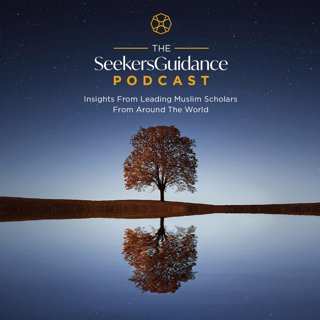
The Prophet Muhammad’s Love for Sayyida Khadija – Shaykh Yahya Rhodus
In this podcast, Shaykh Yahya Rhodus calls the believers to reflect on the history in the Qur’an being a sacred history. Shaykh Yahya goes on to explain the high rank of Sayyida Khadija and how every time the Prophet Muhammad (peace and blessings be upon him)left the house he mentioned her out of a heartfelt connection. Shaykh Yahya goes on to give a lovely metaphor when he said Sayyida Khadija was like the womb for the birth of Islam. She nurtured, comforted and gave reassurance to the Prophet Muhammad (peace and blessings be upon him), and supported him. The first bond of Islam was with Sayyida Khadija. At the first revelation she gave testimony of 5 things about the Prophet Muhammad (peace and blessings be upon him): 1)He maintains family ties 2) You bare the burdens of others 3) You give to the needy and raise them4) You show hospitality 5) You assist during times of calamity Shaykh Yahya ended by saying when he thinks of Sayyida Khadija he thinks 3 things: Support, Sacrifice, and Service. This talk took place at the Harrow mosque in the U.K. Larayb Institute for Education Checkout all of the SeekersHub podcasts by visiting https://seekersguidance.org/podcasts/.
24 Okt 201735min

The Great Event: Surat al-Waqi’a and the Three Groups of People in the Hereafter – Shaykh Faraz Rabbani
In this Friday khutba, Shaykh Faraz Rabbani calls the believers to reflect on the urgent call in Surat al-Waqi’a (Sura 56 of the Qur'an) to turn to Allah through realization of the majestic qualities of Allah. Shaykh Faraz explains how none will deny the reality of the hereafter to occur. Shaykh Faraz goes on to explain that there are three groups that will be resurrected on the day of judgment: 1) People of the right hand - eternal contentment, reward, and joy 2) People of the left hand - eternal loss, and external misery 3) Very foremost - they are drawn closer to Allah Lastly the three qualities of the foremost are mentioned: 1) Sincerity in everything one does. 2) Strive in everything one does in the best way possible. 3) Hasten to forgiveness when one falls short. --- This Friday khutba was delivered by Shaykh Faraz at the Bosnian Islamic Association “Gazi Husrev-Beg” (http://www.biaghb.com/) in Toronto, in October 2017. Checkout all of the SeekersGuidance podcasts by visiting https://seekersguidance.org/podcasts/.
18 Okt 201730min

The Power Of Storytelling with Ustadha Mehded Maryam Sinclair
Renowned Muslim author and story-teller were interviewed by Aashif Sacha, in Auckland, New Zealand. He says: "I was fortunate enough to meet Ustadha Mehded Maryam Sinclair on a sunny Auckland morning. From the moment I met her, she filled the room with grace. As she gazed out of the window, Ustadha Mehded spoke candidly about her journey into storytelling, the challenges she experienced and she also offers some timeless wisdom that all listeners will benefit from." With that, we invite you to listen to the interview. Checkout Ustadha Mehded's books here at Firdous Books Check out all of the SeekersHub podcasts by visiting https://seekerguidance.org/podcasts/
4 Okt 201741min

What Is Your Struggle for Good? – Shaykh Faraz Rabbani
In this Friday sermon, Shaykh Faraz Rabbani reflects on the momentous day of Ashura (10th of Muharram), and the great events that historically took place on that day. The stories tell of noble struggles for good, for the sake of Allah Most High. Shaykh Faraz then asks: "what is our individual struggle through which we turn to Allah and seek His closeness?" Shaykh Faraz recounts the stories of Moses with Pharaoh, because it was on this day that Allah Most High saved Moses and his people from Pharaoh, as has come in the hadith. He also recounts the story of the martyrdom of al-Hussayn (may Allah be pleased with him), the grandson of Prophet Muhammad (peace and blessings be upon him). Shaykh Faraz also recounts the migration (hijra) of Prophet Muhammad (peace and blessings be upon him), as we have just entered into the new Hijri year. All of these stories portray a struggle for good, for the sake of Allah Most High. Shaykh Faraz then calls everyone to ask themselves "what is my struggle in this life to turn to Allah?" The struggle could be getting up for Fajr, keeping up the five daily prayers, spending in the way of good, upholding justice, etc. The struggle is anything that one exerts themselves, time and effort seeking Allah thereby. He finally calls to take ourselves into account on how we spend our time, and to try to make good use of our lives. This Friday sermon was delivered in September of 2017 at the University of Toronto. Checkout all of the SeekersGuidance podcasts by visiting https://seekersguidance.org/podcasts/
4 Okt 201725min

Migrations: Three Lessons from the Migration (Hijra) of the Prophet Muhammad ﷺ – Shaykh Faraz Rabbani
As we begin the new Hijri year, Shaykh Faraz reflects on the story of Prophet Muhammad's (peace and blessings be upon him) migration (hijra). He focuses on three glimpses from that story and highlights some valuable and timely lessons. Among the lessons are: (1) how to plan and achieve goals, (2) doing the right thing with the right intention while relying fully on Allah, (3) displaying excellence in character, and (4) making all our choices for the sake of Allah and embracing the example of His Messenger (peace and blessings be upon him). The first glimpse Shaykh Faraz recounts of the story of Prophet Muhammad's (peace and blessings be upon him) migration (hijra), is in the phase of preparation. Sayyiduna Abu Bakr as-Siddiq (may Allah be pleased with him) had prepared well in advance by purchasing and equipping the camels for migration. He did not know the exact time of the migration, but was ready for it. In this we see the importance of taking the right means to achieve goals. Hope (raja') is a praiseworthy trait. Hope is to wish for something pleasing while taking the right means that will result in the outcomes you wish for. Otherwise it is false hope and blameworthy. We also see in this event that the Prophet (peace and blessings be upon him) refused to take the camel he traveled on for free from Abu Bakr as-Siddiq (may Allah be pleased with him). He payed for it in full. We learn from this that one intends and strives to not be dependant. The second glimpse Shaykh Faraz highlights is whenProphet Muhammad (peace and blessings be upon him) and Abu Bakr as-Siddiq (may Allah be pleased with him) headed out for the migration. Abu Bakr (may Allah be please with him) had deep concern for the Prophet (peace and blessings be upon him) and feared for any harm to befall him. So Abu Bakr would walk around theProphet (peace and blessings be upon him) to protect him from all directions. He entered the cave before the Prophet (peace and blessings be upon him) to try to secure it. And when the men from Quraysh caught up with them and stood right outside the cave, he expressed his fear that they may see them. However, the Prophet (peace and blessings be upon him) said as is narrated in the Qur'an: "Don't worry, Allah is with us" [Surat al-Tawba, 40]. So when facing any trials and difficulties, remember Allah is with us. If you are doing the right thing with the right intention, even if things don't work out, then you are successful with Allah. The third glimpse covered by Shaykh Faraz is when theProphet (peace and blessings be upon him) passing by the tent of Umm Ma'bad in the middle of the desert. They were seeking milk to drink and found only a weak goat with her that didn't give milk. The Prophet (peace and blessings be upon him) was granted the miracle of the goat producing abundant milk when he rubbed its udder. In this story, Umm Ma'bad recounts the event to her husband when he returns to the tent. She describes the amazing character and excellent character of theProphet (peace and blessings be upon him). She describes the dignity, beauty and virtue in dealing of theProphet (peace and blessings be upon him). Umm Ma'bad and her husband later became Muslims because of what they witnessed of the Prophet's (peace and blessings be upon him) excellent character. As Muslims and followers of Prophet Muhammad (peace and blessings be upon him) should display excellence of character. This is how we uphold our connection to the Prophet (peace and blessings be upon him), by connecting to his character. The way to call to Allah starts with character not words. Finally, Shaykh Faraz narrates the hadith of intentions, which is connected to the story of the migration. Prophet Muhammad (peace and blessings be upon him) said: "Actions are by their intentions, and each person shall have whatever they intended. So whoever's migration was to Allah and His Messenger, then their migration was to Allah and His Messenger.
27 Sep 201733min

Believers and Tribulations: Faith Entails Being Ambassadors of Mercy — With Certitude and Contentment – Shaykh Faraz Rabbani
As we see all the tribulations that have befallen the Muslims and humanity at large, one could be easily overwhelmed. On one extreme one could feel despair, and on another one could choose to ignore all these events. However, the believer's balance and the Sunna of Prophet Muhammad (peace and blessings be upon him) is to care and have sincere and deep concern. In this Friday khutba, Shaykh Faraz Rabbani tells us how believers should respond to the tribulations happening around us. This Friday khutba was delivered by Shaykh Faraz at the Bosnian Islamic Association “Gazi Husrev-Beg” (http://www.biaghb.com/) in Toronto, in September 2017. Checkout all of the SeekersHub podcasts by visiting http://seekershub.org/podcasts/.
20 Sep 201727min

Tests and Tribulations Are Blessings: The Divine Promise That We Will Be Tested, Explained – Shaykh Faraz Rabbani
Why do trials and tribulations happen in our lives? Why does Allah allow earthquakes, floods, and other disasters and destructive events? Shaykh Faraz Rabbani explains two verses of the Qur'an (2.155-156) on the Divine Promise that all people will be tested--with life itself being nothing but a test. Allah Most High promises, "We will certainly test you with some fear and poverty, and loss of property, life, and crops..." [Qur'an, 2.155] The key to right response to tests is to be steadfastly patient (sabr). Patience is not passiveness, Shaykh Faraz explains, but rather, "Remaining firm on what is pleasing to Allah." The reality of tests is that they are opportunities to respond with faith and good deeds. As such, tests are opportunities to seek Allah's Pleasure, Love, and Closeness. That is why Allah tells us, "And give glad tidings to the steadfast." [Qur'an, 2.156] This arises from consciousness that, "Truly we are Allah's, and truly it is to Him that we are returning." [Qur'an, 2.157] The consequence of such steadfast response to tests is true success: "They are the ones who will receive Allah’s blessings and mercy. And it is they who are truly guided." وَلَنَبْلُوَنَّكُمْ بِشَيْءٍ مِنَ الْخَوْفِ وَالْجُوعِ وَنَقْصٍ مِنَ الْأَمْوَالِ وَالْأَنْفُسِ وَالثَّمَرَاتِ ۗ وَبَشِّرِ الصَّابِرِينَ We will certainly test you with some fear and poverty, and loss of property, life, and crops. But give glad tidings to those who remain steadfast — 2:155 الَّذِينَ إِذَا أَصَابَتْهُمْ مُصِيبَةٌ قَالُوا إِنَّا لِلَّهِ وَإِنَّا إِلَيْهِ رَاجِعُونَ who, when faced with a disaster, say, “Surely to Allah we belong and to Him we will ˹all˺ return.” 2:156 أُولَٰئِكَ عَلَيْهِمْ صَلَوَاتٌ مِنْ رَبِّهِمْ وَرَحْمَةٌ ۖ وَأُولَٰئِكَ هُمُ الْمُهْتَدُونَ They are the ones who will receive Allah’s blessings and mercy. And it is they who are ˹rightly˺ guided. 2:157 This Friday khutba was delivered at Sayeda Khadija Centre (http://www.skcentre.com/) in Mississauga, in September 2017. Checkout all of the SeekersGuidance podcasts by visiting https://seekersguidance.org/podcasts/. Cover photo by Julien Parent [cwa id='cta']
13 Sep 201726min

The Great Intercession of Our Prophet Muhammad ﷺ – Shaykh Faraz Rabbani
In this talk, Shaykh Faraz reads and explains the lengthy hadith on Prophet Muhammad's (peace and blessings be upon him) great intercession in the hereafter. The hadith highlights the great rank of the Prophet (peace and blessings be upon him), the events of the hereafter of people seeking the different prophets' intercessions, and the care and concern of the Prophet (peace and blessings be upon him) for his people. This talk was given as part of the live series at SeekersHub Toronto: "The Rawha: Daily Guidance for Seekers". The Rawha is available on podcast here: https://seekersguidance.org/names/the-rawha-daily-guidance/. Checkout all of the SeekersGuidance podcasts by visiting https://seekersguidance.org/podcasts/
6 Sep 201730min





















